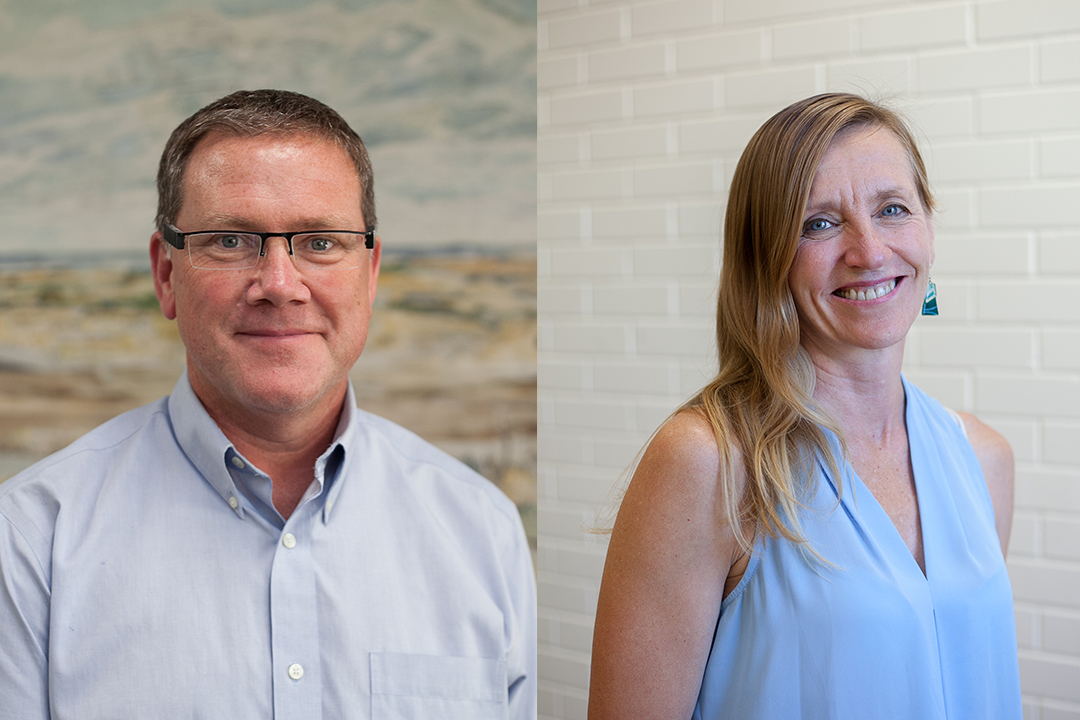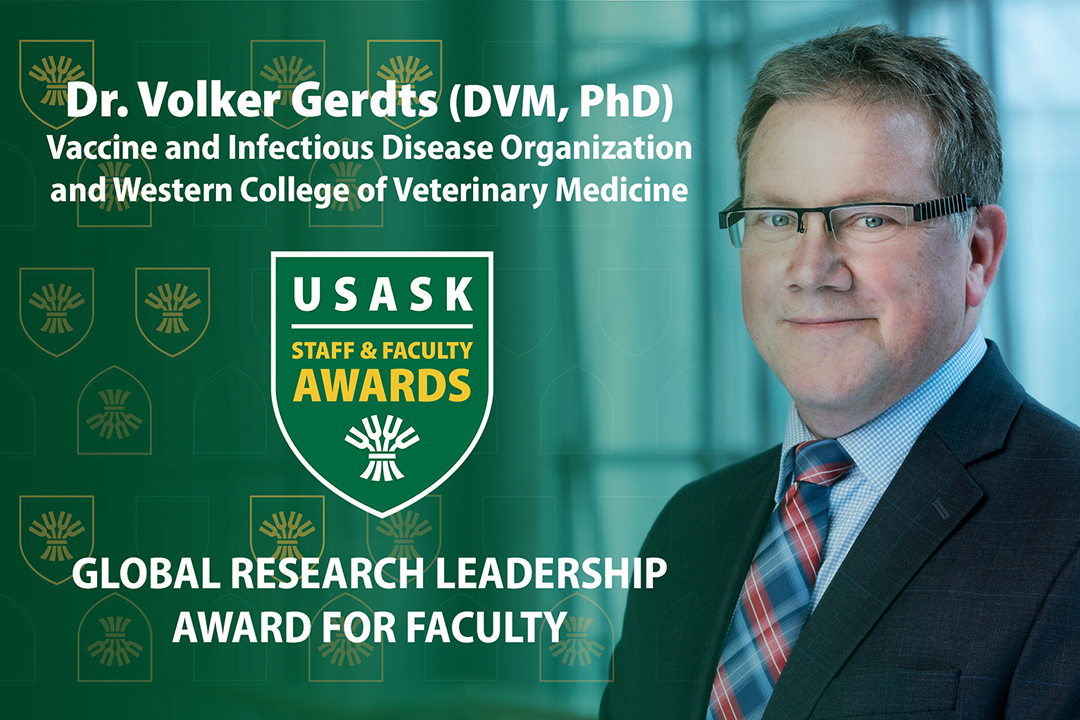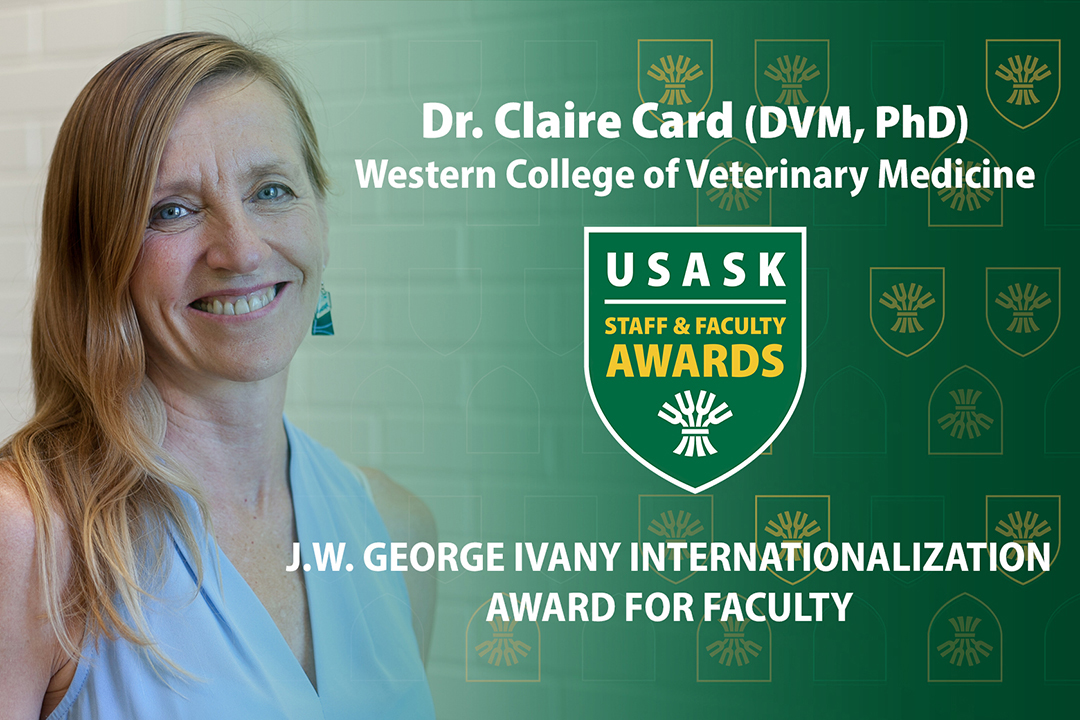
WCVM faculty earn awards for their international efforts
Two faculty members at the Western College of Veterinary Medicine (WCVM) have received international awards from the University of Saskatchewan (USask) in recognition of their exceptional efforts to improve the lives of people and animals around the world.
By WCVM TodayDr. Volker Gerdts (DVM), a professor in the WCVM’s Department of Veterinary Microbiology, is the 2022 recipient of the Global Research Leadership Award for Faculty. Dr. Claire Card (DVM), a professor in the college’s Department of Large Animal Clinical Sciences, received this year’s J.W. George Ivany Internationalization Award for Faculty.
“We’re so very proud of both Drs. Gerdts and Card and their involvement in global-scale initiatives that have made a significant impact on communities around the world,” said WCVM Dean Dr. Gillian Muir. “The contributions that they have made in their respective areas are making lasting differences in the health and lives of both humans and animals.”
These two awards — along with the Global Research Leadership Award for Students and the International Engagement Service Award for Staff — are administered by the university’s International Office. Created as part of the university’s Blueprint for Action 2025, these awards recognize the achievements of faculty, staff and students who make outstanding contributions to the university’s global perspective.

Global Research Leadership Award for Faculty
Gerdts is an internationally recognized researcher of human and animal vaccines, and as CEO and director of the Vaccine and Infectious Disease Organization (VIDO), he has played a major role in positioning the organization and USask as global leaders in the COVID-19 pandemic relief efforts. Under Gerdts’ leadership, VIDO responded quickly to the COVID-19 pandemic. VIDO scientists were the first in Canada to isolate SARS-CoV-2, to develop an animal model for testing vaccines, antivirals and therapeutics, and to have a candidate vaccine in pre-clinical testing. VIDO’s COVID-19 subunit vaccine is now in human clinical trials in Africa and Canada.
While his work to combat the COVID-19 pandemic alone would be worthy of recognition by the USask, Gerdts also has a two-decade legacy of working to protect and improve the health of human and animal populations globally. Through his work on animal diseases, he’s helped to improve the success of livestock producers. His human health research has saved lives, prevented illness and improved global access to vaccines. Here are some highlights of his international efforts:
- Beginning in 2005, Gerdts leveraged $6 million from the Bill and Melinda Gates Foundation’s Grand Challenges in Global Health program to develop a novel, single-dose adjuvant for humans and animals, which has been licensed to several companies for use in various species. As part of this research, Gerdts was part of a team to evaluate efficacy of vaccines administered to pregnant mothers to protect their babies from viral infections after birth.
- His study of the development of the immune system in utero was published in Nature Medicine and contributed to the development of a universal protocol for vaccination of pregnant women, who now routinely receive the pertussis (whooping cough) vaccine to protect their babies against disease.
- Gerdts continues to work on a vaccination platform for neonates and a vaccine for respiratory syncytial (RSV) — a respiratory infection that can be fatal in newborns — is about to enter the clinical phase. The team has also developed a novel vaccine for whooping cough that’s available for licensing.
- From 2010 to 2020, Gerdts was part of several projects related to developing novel vaccines for sub-Saharan Africa. He was part of a team that developed a heat-stable, single-dose vaccine to provide livestock with long-term defences against five different diseases. The vaccine will improve food security and economic outcomes for smallholder farmers.
- Another example is a vaccine for Lung Plaque in cattle, a disease endemic to sub-Saharan Africa. In 2019, the vaccine received the “best veterinary vaccine” award from the World Vaccine Congress.
- A chlamydia epidemic among Australia’s koalas is thought to be the cause of plummeting population numbers, and Gerdts has co-developed a novel vaccine, which is in clinical testing, against the disease to protect koalas and sheep.

J.W. George Ivany Internationalization Award for Faculty
Card is a professor and board-certified theriogenologist at the WCVM. In the past three decades, she has inspired many students to seek out opportunities for international engagement and cross-cultural learning.
Card’s interest in international development began more than 30 years ago while she was an undergraduate student on exchange in Sweden. She became involved with Veterinarians Without Borders-Vétérinaires sans Frontières (VWB-VSF) in Uganda in 1996, and since then, she has continued to expand different programs in that country.
As a veterinarian, Card knows firsthand the difference that livestock ownership can have in improving people’s lives. She has made a direct impact on the lives and livelihoods of many women and children in sub-Saharan Africa through her international development work. Here are highlights:
- During a visit to the Queen Elizabeth National Park in Uganda in 2006, Card was approached by leaders of the Foundation for AIDS Orphaned Children, who sought her help with their livestock projects. This initial arrangement turned into a lengthy partnership — helping HIV-AIDS-affected families in rural Uganda improve their livelihoods.
- Since 2006, Card has encouraged more than 100 Canadian students to travel to Uganda and participate in programs that have improved animal welfare, facilitated community health worker training, and improved economic outcomes — mainly for women.
- Through facilitating micro-financing and goat pass-on projects, Card has helped women earn a living through livestock production, enabling them to feed their families and send their children to school. Besides encouraging students to participate in these projects, Card has also helped to provide vital veterinary services for thousands of animals.
- By teaching animal husbandry and training women to become “paravets” or community-based animal care providers, Card has helped to improve animal health services at the village level. These paravets are trained to diagnose illnesses, recommend treatments and vaccinate livestock. Card has helped to train 32 paravets as well as another five women who continue to offer locally-based paravet training. In total, 55 USask students from various disciplines have participated in this program.
- Card has held many academic leadership positions promoting internationalization, including past chair of the International Activities Committee of Council, chair of the University Council and membership on the International Co-ordinating Committee. She is past local USask chapter president, vice-president and long-term board member of VWB-VSF International Canada. She was named VWB-VSF Volunteer of the Year in 2018.
- In 2006 and 2007, Card co-instructed a course with 28 Ugandan students from Makerere University and WCVM veterinary students. This was the start of a partnership between Mbarara University to develop capacity in rural Uganda. Between 2012 and 2014, Card led a Leadership and Community Placement Program with Mbarara University, involving 15 USask health science students. As co-applicant of a Queen Elizabeth Scholarship program, Card helped bring together 39 USask health sciences students with Ugandan students during a four-year period.
- Through her teaching, Card promotes a One Health/ecohealth approach to addressing global problems. She helps students understand how veterinary medicine is connected to solving global problems such as poverty, climate change, reconciliation, inequality and empowerment of women.
- Along with Dr. Sarah Zelinski, a WCVM graduate, Card helped to create the Pads Project, providing education and reusable menstrual products to girls and young women. So far, this program has had an impact on the lives of more than 500 girls and has helped to improve school retention.
Click here to read more about all of the 2022 USask faculty and staff award recipients.
